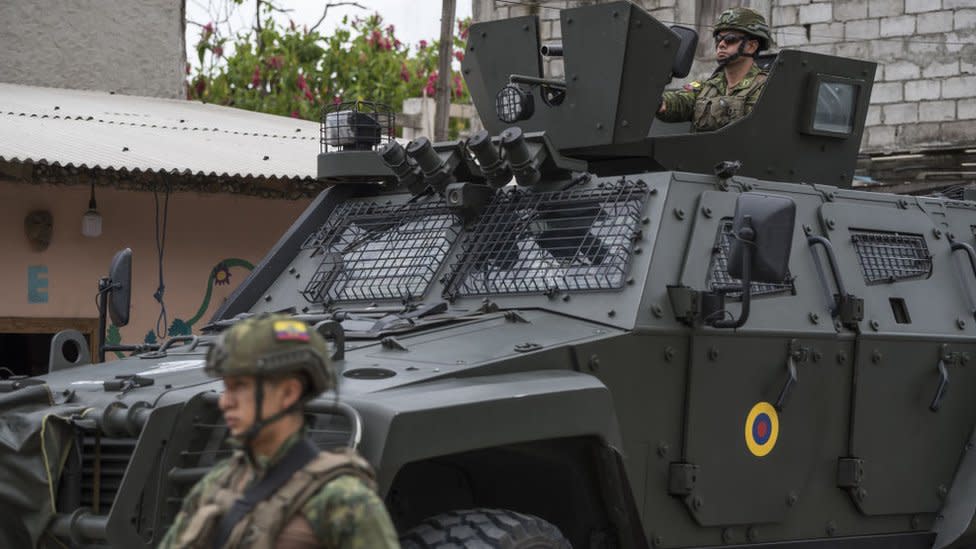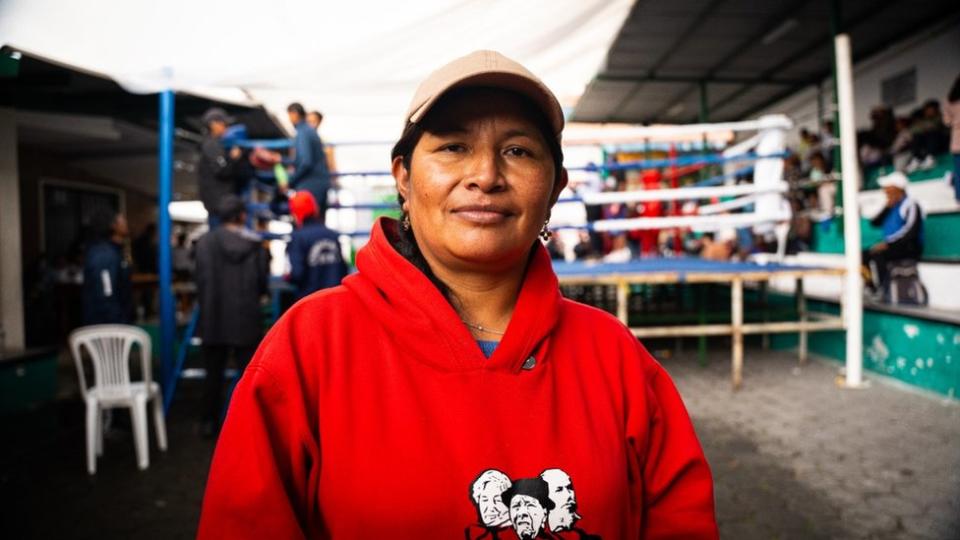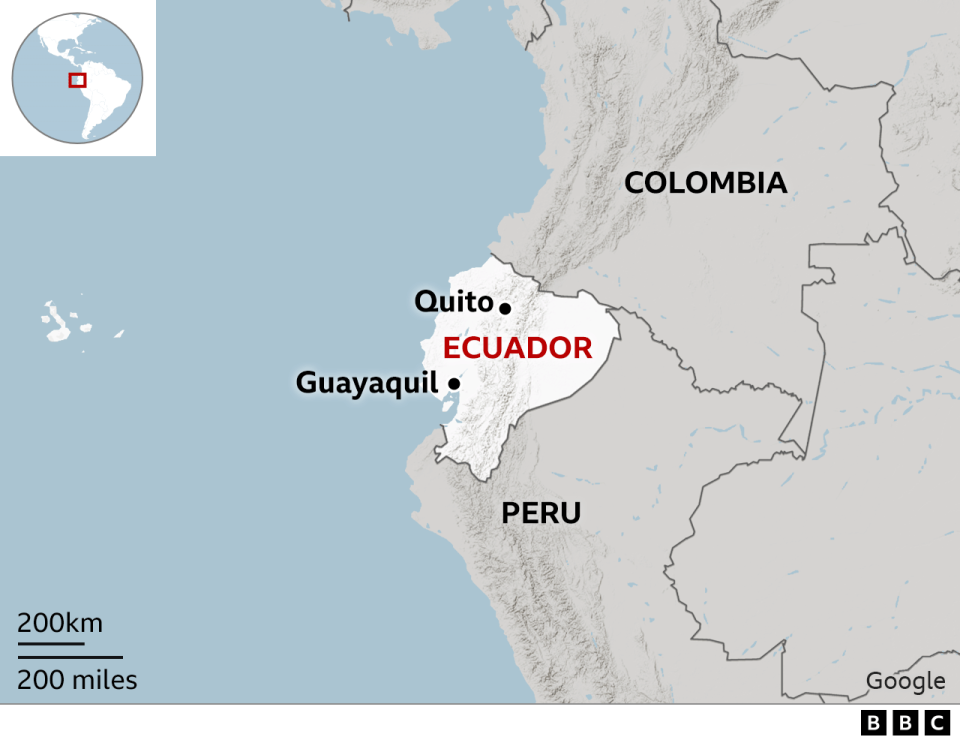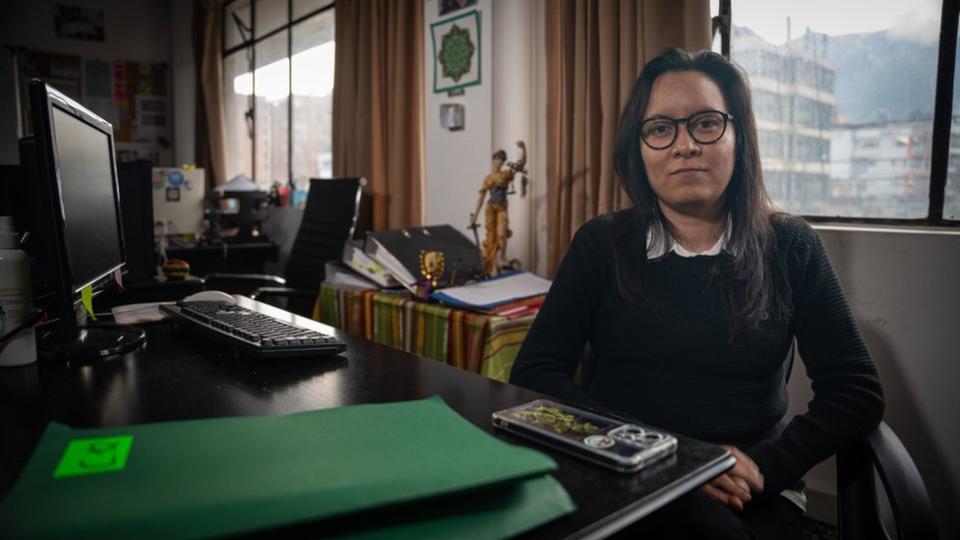Ecuador voters back tougher security to fight gang violence

Ecuadoreans have voted in favour of allowing the military to patrol their streets as part of a referendum on bolstering security in the country.
The poll was called after Ecuador went from being relatively peaceful to having the highest recorded murder rate in Latin America.
Voters also backed longer prison terms and extraditing violent criminals.
But human rights groups have raised concerns that the measures could lead to abuses.
President Daniel Noboa called the referendum following a spate of high-profile murders, including the assassination of a presidential candidate last year and several mayors in recent months.
In 2023, police recorded about 8,000 violent deaths and in January the country was rocked by a wave of violence which saw a top gang leader escape from jail, prison riots and staff at a TV station being held hostage by armed gang members while they were live on air.
President Noboa subsequently declared a state of emergency and brought in the military to fight criminal gangs and control the prisons - but the result of the referendum will allow him to expand the powers of the military and the police on a longer-term basis.
At the polls, many of those voting "yes" to the raft of security measures said they had felt safer on the streets since the military presence had increased.
Carmen Elena Simbaña, whose youngest brother Darwin was killed two years ago, however, was not one of them.

Darwin was just 19 when he was stabbed to death by a gang member wanting money. Ms Simbaña said the murder happened "in the midst of police officers, who were around and did not come to help".
But despite her personal experience, she voted against the new measures, saying "militarising the country is not the solution".
Her son witnessed the murder of her brother, and people have come to her house threatening to kill him should the gang member responsible ever end up in jail.
"The root of all crime is abandonment," Ms Simbaña told BBC News, adding that she wanted to see investment in youth, such as "spaces for children to occupy themselves with sport, music, art", rather than more money for the military.
A cocaine dealer known as "El Gato" (The Cat) is perhaps one example for Ms Simbaña's argument. The 29-year-old blamed his descent into crime on his family's financial problems, which forced his mother to work late.
"I was alone in the house, crying and screaming for her," he said, describing how he fell in with "bad friends", including members of some of Ecuador's most violent gangs, who introduced him to drugs.
"El Gato" started using and dealing drugs when he was just 14 years old and is still addicted 15 years later.
He can make $100 (£80) from just one drug sale, some of which he said is used to fund his own addiction.
He tried to kick the habit but has found it hard: "Obviously, I want to leave this, right? But it is such a strong addiction. I have gone to rehabilitation centres, I have locked myself in my family's house."
Despite his own involvement in the drugs trade, "El Gato" urged people to vote in favour of the tougher security measures, arguing that being surrounded by crime and drugs had made it harder for him to give up drugs.
"When I go and you have it out around the corner, that is the problem," he said.
His friend, David Rodríguez, agreed, saying "El Gato" was a "kid who should have been playing ball in the park".
"Instead he is selling drugs for people like him, to get them into the habit, recruit them, and make a profit from it."
Like "El Gato", he also backed the new security measures. Mr Rodríguez has been the victim of six "express kidnappings", during which he was drugged, taken to a cash point and forced to withdraw money to hand over to his assailants.
"We need a break and a change," he said, adding that he believed that "the military does give that relief to citizens".
Violent crimes like those experienced by Carmen Elena Simbaña and David Rodríguez have become commonplace in Ecuador.
The country is wedged between the world's two biggest cocaine producers - Colombia and Peru - and its ports provide convenient routes to ship the drug to the US and Europe, where demand is growing.

Ecuador's economic slump during the Covid-19 pandemic pushed many young people into gangs and its relaxed visa system led to many international gangs moving in.
The referendum also asked people to back the legalisation of hourly work contracts, which the government said would help get young people into work and away from crime. Critics argued it would roll back workers' rights and it did not pass.
But the main focus has been on the new security measures.
President Noboa has welcomed their approval in the referendum, saying "now we will have more tools to fight crime and restore peace to Ecuadoran families".
However, some human rights groups argue they could lead to human rights abuses, including mass arrests and arbitrary detentions, such as that of Carlos Méndez.
Mr Méndez was leaving work when police on motorcycles, carrying out a raid nearby, stopped him and started violently beating him.
His father, also called Carlos, said the incident still haunted the family: "It was a trauma. We have that fear this could happen again."
Rosa Bolaños, of human rights group INREDH, warned that the new measures could lead to more incidents like this.

She instead wants money to be invested in getting the 5,000 children in the region who are out of school back into education.
But she also laid blame on cocaine users in wealthier nations. "The cost of a good party, of fun, of even being a workaholic - is the kid who is murdered every day in the streets," Ms Bolaños said.
"It's the blood of a whole country. Because cocaine is not just drug lords and gangs. It involves the people that live in poverty, on $1 a day."


